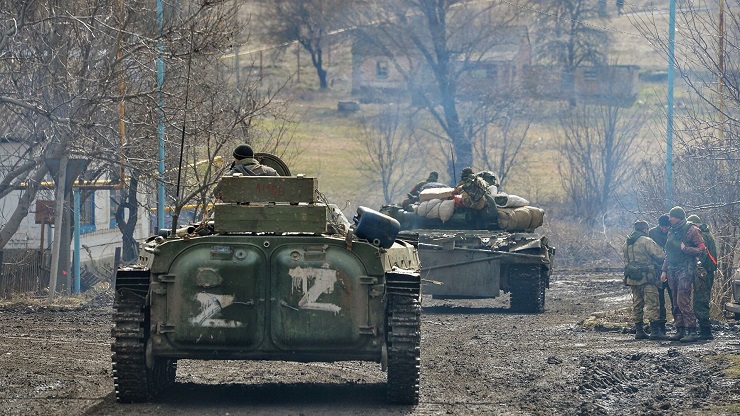As recent events surrounding the ongoing conflict in Ukraine have shown unambiguously – and quite convincingly – the West’s so-called ‘war effort’ in Ukraine is less about defending Ukraine and more about what some Western pundits call “erasing” Russia as a power capable of wielding influence at the global level. The war, in simple words, is aimed at causing a change of policies within Russia itself. This is indeed what Biden meant when he said –he later backtracked on for tactical reasons – that Russia’s Vladimir Putin cannot remain in power. This is a clear-cut agenda of direct interference even according to the Western standards, standards that numerous US officials have been repeating to remind the world ever since Hillary Clinton claimed, in 2016, that her defeat – and Trump’s victory – in the 2016 US presidential elections was a result of “Russian interference” – a claim never backed with credible and/or conclusive evidence. But it is clear that the US, the leading NATO force, is quite explicitly fighting a war against Russia.
Indeed, this is precisely why the NATO chief, reminding the world of the US involvement against the Soviet Union in Afghanistan in the 1980s, said that the war in Ukraine could last for years no matter the military cost and/or the continuously rising energy and food prices. While Joe Biden tried to make it clear that the US will not fight Russia directly in Ukraine, it remains that the US never fought the Soviet Union directly either in Afghanistan while it kept arming and training the Afghan Mujahideen groups for a decade. This is precisely what the US/NATO are hoping to achieve in Ukraine as well. Billions have been provided in “security aid.” This is on top of modern military hardware the US and NATO countries are providing since the beginning of the conflict in late February.
Again, the purpose is not to defend Ukraine but to inflict a defeat on Russia to dilute it permanently as a super-power. Biden’s closest ally, Boris Johnson, shares this enthusiasm more than many other European leaders. Johnson keenly expressed this sentiment in a recent article he wrote for The Sunday Times arguing that the West must “steel” itself “for a long war” with a view to enhancing Ukraine’s ability to not only defend itself but also “renew its capacity to attack” the Russian forces inside Ukraine and even beyond. Johnson, in other words, wants to take the war to the Russians.
This is seen as a vital part of the overall western ‘war effort,’ because Russian military operations in Ukraine – which came against the backdrop of Washington’s aggressive push to expand NATO to include Ukraine and encircle Russia – is being overwhelmingly seen as a war against the West or the West-dominated international system, which has been in place since the end of the Second World War. Were Russia to prevail in Ukraine, it could mean the beginning of the end of this US-dominated system, which is why many anti-Russia political pundits in the US think – and project – the utmost necessity of defeating Russia squarely in Ukraine. That’s precisely why Johnson argued that winning the war is necessary for “our allies [and we] will be protecting our own security as much as Ukraine’s and safeguarding the world.”
But can the West really pull off a ‘total victory’ and continue the long war its leaders and pundits are projecting? An economic crisis is already setting in Europe and the US, with rising energy and food prices becoming a mass – and a politically contentious – issue for these countries to deal with. In May, the inflation rate in Europe was a record high at 8.1 per cent. This inflation rate is more than four times the European Central Bank’s target and estimate, thus showing how the West is itself heading to a situation where fighting the so-called “long war” could become too costly to continue and that they might ultimately have to change their plans for NATO expansion and/or defeat Russia.
The real question, then, is: will western leaders be able to project the same anger – and populist enthusiasm – towards Russia when the changing economic situation starts hitting the masses and the masses turn to the streets against them? As it stands, the anti-Russia projections by key western leaders are already being used as a useful distraction for the masses to consume and support the overall ‘war effort’ regardless of the price the people might have to pay themselves knowingly or unknowingly. But this cannot – and will not – go on forever. The masses cannot be fooled permanently.
As far as Russia is concerned, the West’s policy of sanctioning Russia’s oil has not led to an expected decline in the Russian economy. As the data shared recently by Beijing shows, Russia has already surpassed Saudi Arabia as the leading supplier of oil to China. This is despite the fact that Russia today is the most sanctioned country in the world with more than 10,500 different restrictions imposed on its various companies and individuals. Out of these, 7,500 were imposed in the last four months alone. But the Russian economy is far from the verge of collapse – something the West calculated will happen rather quickly.
The narrative in the West is, therefore, being changed to prepare the masses for a “long war.” Western leaders are in a dilemma. If Russia succeeds, this will be bad for their political future insofar as they have spent hundreds of days projecting Russia as “weak.” If the war drags on, the cost will be too high for the masses to provide unconditional support. But regardless of how things unfold over the next days/months, what’s almost certain is that western politicians and media will be upgrading their projection of the war in Ukraine as a war against Russia.
Salman Rafi Sheikh, research-analyst of International Relations and Pakistan’s foreign and domestic affairs, exclusively for the online magazine “New Eastern Outlook”.

